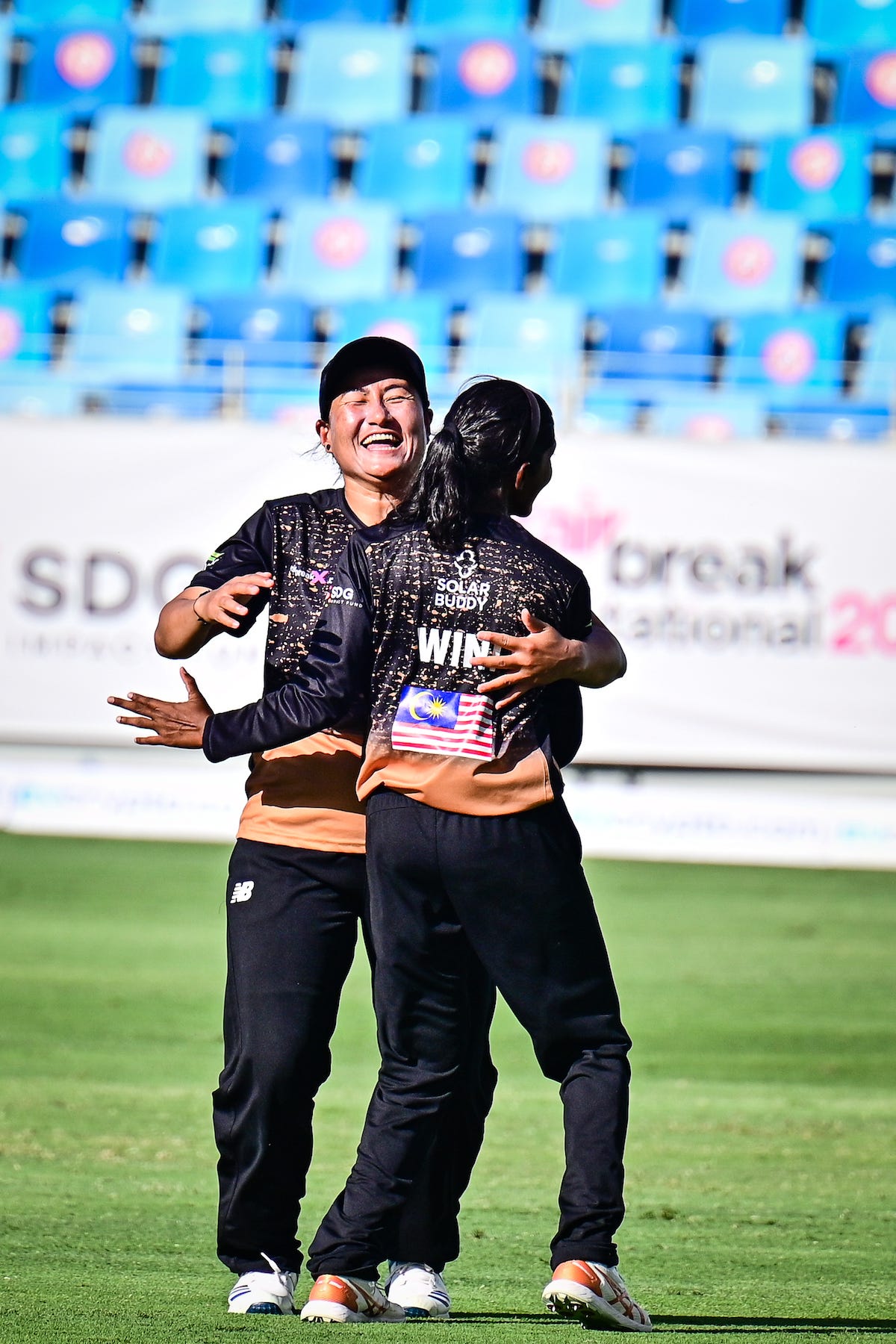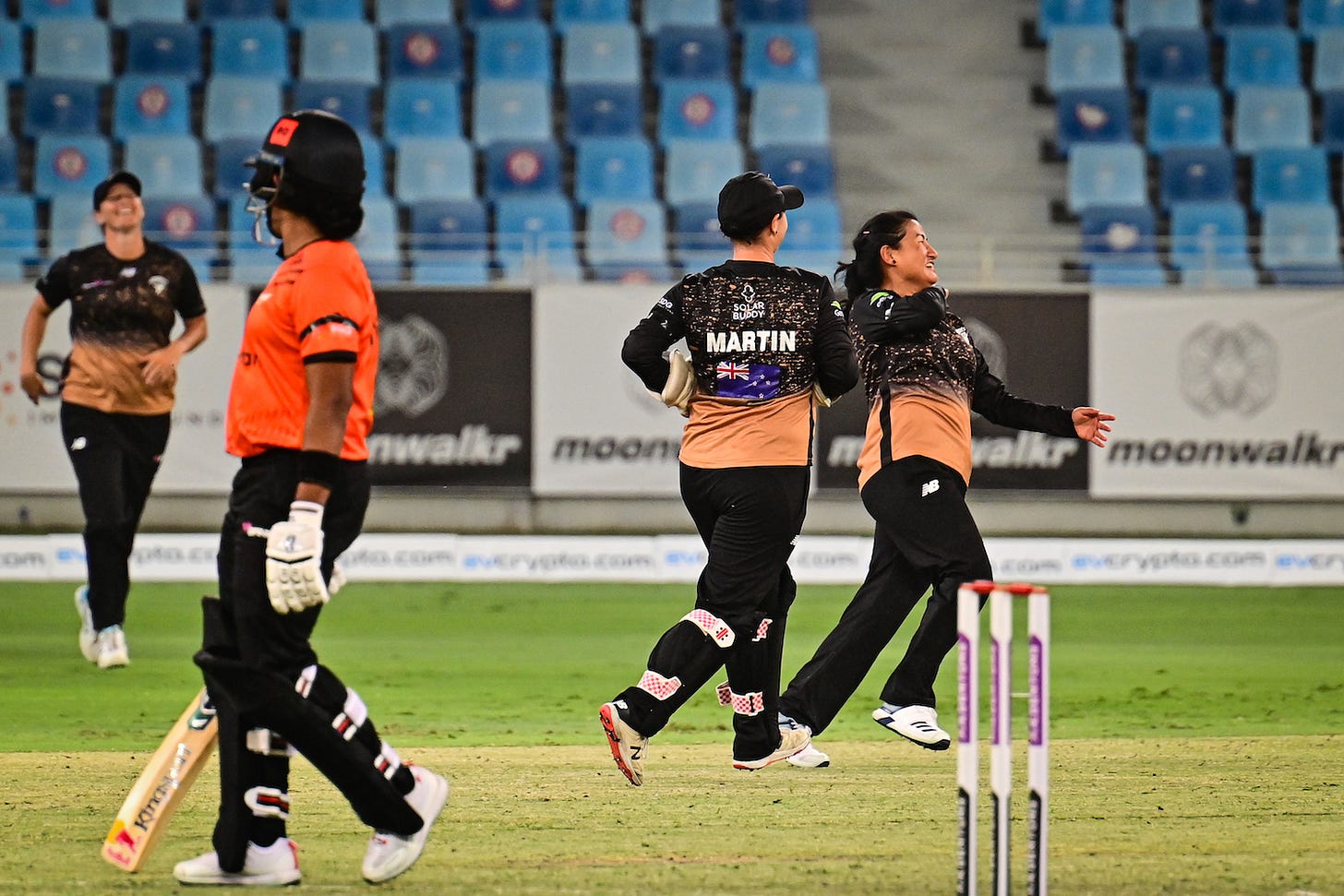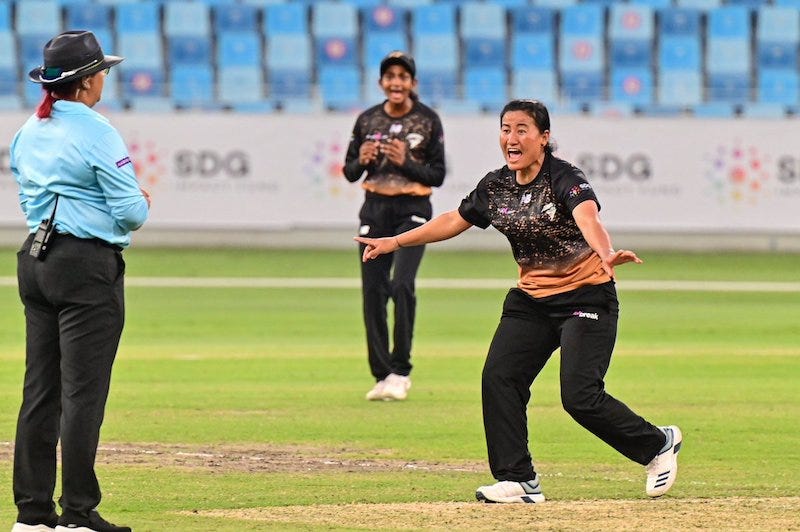Sita Rana Magar: Her origins, journey, and struggle
Nepal veteran Sita Rana Magar talks about the FairBreak Invitational, systemic issues with Nepal women’s cricket, and more
15 years and she didn’t even get a phone call.
As she prepared for the final of the 2022 FairBreak Invitational, Tornadoes all-rounder Sita Rana Magar had no idea that she’d been removed as Nepal’s vice-captain. Remarkably, she only found out about her sacking through reading the news.
‘If you expect professionalism from players then at least show some from your side first,’ she said at a press conference in Nepal after the Tornadoes won the FairBreak Invitational.
Sita is not wrong. The Cricket Association of Nepal (CAN) has a longstanding reputation of mismanaging the sport in a country with the single largest fan base in the associate world. Their callous treatment of Sita, a legend who has served Nepal for more than a decade and a half, has betrayed their historical apathy toward the women’s game in the country.

It’s funny. When I first started planning this piece, it wasn’t supposed to focus on CAN’s incompetence and indifference to its players.
So I hope you can excuse this extended, yet necessary prologue. It is, after all, the elephant in the room.
Yet, Sita is more than just a victim of a cold, incompetent board. She is a pioneer and a flag-bearer of the women’s game in Nepal. So, before we go down the rabbit hole of CAN, here is the story of Sita Rana Magar.
*****
The all-rounder, who bowls left-arm spin and bats left-handed, was part of the first-ever Nepal women’s team set up in 2007 by LB Chhetri, Nepal’s second-ever men’s captain who is widely regarded as the father of Nepali Women’s cricket.
Yet, when she first started playing cricket, she did not like it as much as she liked football. Sita wanted to play football for Nepal, but after representing the country for three years on the cricket field, she began to take the sport more seriously.
That was around the time when Nepal won the 2010 ACC Under-19 Women’s Championship. It was their second successive ACC Under-19 title after winning the 2008 iteration of the tournament.
Throughout these early triumphs, her mother was very supportive, but her father was harder to win over. He wanted Sita to help out around the house and learn how to cook in order to improve her prospects of finding a suitor for marriage.
‘Being a girl in Nepal, our mothers and fathers wanted us to work at home so that in future when we marry, it will be easy for us [to find a husband],’ she says in conversation with All Over Cricket.
Fortunately, the recognition of Sita’s accomplishments in her neighborhood quickly led to her father softening his conservative stance and taking a much keener interest in her career.
‘After I played two international tournaments, my neighbours told him “Sita is doing great” and they praised me. I think he felt good after knowing that his daughter was doing great.’
‘Now, whenever there is any tournament — international or domestic — he is very much curious. He calls me and asks me about every match,’ she says with a surprised smile on her face.
Sita is just as grateful for the support from her husband who comes from a sporting background.
‘My husband is also a sportsperson. He used to be a boxer and his elder sister and brother are also boxers. He supports me. When I’m at practice, he does all my [house] work. He even cooks when I’m training.’
‘He says, “You play. When you’re done [with your career] then we can have a baby”.’
In spite of this support system, Sita and her teammates have found support hard to come by from CAN. One of the reasons they’ve been leapfrogged by Thailand and the UAE in the Asian region over the years is their lack of domestic and international fixtures.
Shockingly, Nepal’s female cricketers went more than two years without any international cricket between the 2019 South Asian Games and a bilateral series in Qatar in 2021. Meanwhile, the men’s team had been on many tours and hosted matches outside the qualification pathway calendar.
‘We have a few domestic tournaments in Nepal but after that, we just play international tournaments like Qualifiers once a year. That’s not enough for us. Other associations are focusing on women more. Like Thailand. Before Thailand was below us but nowadays they’ve upgraded so much.’
Unlike the men — who in the absence of an organized domestic season have still been able to participate in and earn a living from privately- run T20 leagues — Nepal’s female cricketers have been starved of competitive action outside qualification pathway tournaments.
The Nepal all-rounder is adamant that a similar franchise league for Nepal’s women would be a game-changer for her and the nation’s female cricketers.
‘We could earn money from there so it would be easy to sustain our lives. But it’s not just about money. We’ll be more professional and we’ll be recognised by more fans in Nepal and in other countries as well.’
In spite of a board that is yet to demonstrate a strong commitment toward the growth of women’s cricket, Sita’s talents were on show for the Tornadoes at the recently concluded FairBreak Invitational. She picked up four wickets in seven games at an economy rate of 7.50. These raw stats may not do her justice, but Sita regularly bowled in the Powerplay along with delivering crucial overs in the middle of the innings.
She teamed up with Malaysia’s Wini Duraisingam and Thailand’s Chanida Sutthiruang to form a bowling core that punched above expectations and helped the Tornadoes win the tournament.
Before the FairBreak Invitational, Sita and Wini had faced off numerous times for Nepal and Malaysia, respectively, having begun their international careers at around the same time. Now, their bond has grown much stronger to the point where they’re virtually inseparable.
‘Wini! Wini!” she exclaims as the biggest smile of her day breaks out on her face. ‘From the very first day in FairBreak, we sat together on the bus. We’ve known each other for long so we were friends, but FairBreak has made us great friends.’
Just as importantly, the Invitational has given Sita the opportunity to pick the brains of some of the world’s best players, including New Zealand all-rounder Sophie Devine.
‘It was my first time playing night matches. [Devine] gave me some tips on how to field and how to catch at nighttime,’ she says.

From both Devine and West Indian Stafanie Taylor, she has learned the importance of training smart, especially when it comes to her batting.
“In Nepal, we are doing hard work but not in a smart way. I came to know that senior players just focus on particular areas. In one day if they want to hit long-range shots, they will only focus on that. They won’t do anything else. But in Nepal we don’t do that. We do everything at one time.”
Mixing with professional athletes has also given her the confidence to break out of her shell and improve her communication in English.
‘To be very honest, I was nervous to talk with [Devine and Martin] before,’ admits Sita. ‘I was the one who stayed quiet in the team and I couldn’t understand their accents. But they came to me and said, “Don’t stay quiet. Just speak. Just speak”. I don’t think they’re [just] professional players [anymore]. They are like our mates.’
With the growing popularity of live-streaming and with the Invitational being broadcast in more than 140 countries and territories, Sita recognizes the impact of being more than just a name on a scorecard.
‘When there was no telecast, people didn’t know any women’s players. But now they are streaming live everywhere, so people are recognising us. Now at least they’ve come to know that we exist.’
Indeed, it is hard to imagine the FairBreak Invitational without personalities like Sita Rana Magar. Her cult status can be explained by her on-field exploits, her enthusiastic celebrations, and a growing awareness amongst the global community of how much she has contributed to the women’s game in Nepal.
CAN would be well advised to remember this in all their future interactions with her. Yet, even if they don’t give her the courtesy that she has earned during a distinguished career for Nepal, Sita Rana Magar can take consolation from the fact that she’s already had a lasting impact on Nepali cricket.
Like what you read? Subscribe to All Over Cricket for more stories on women’s cricket and associate cricket!
You can also follow us on Twitter, where we often live tweet during big games and tournaments!






